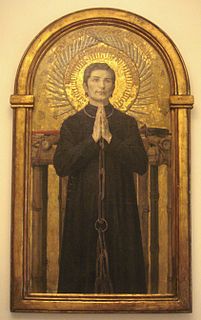A Quote by William Butler Yeats
Let the minor genius go his light way and enjoy his life - the great nature cannot so live, he is never really in holiday mood, even though he often plucks flowers by the wayside and ties them into knots and garlands like little children and lays out on a sunny morning.
Related Quotes
A slight sabre-cut will separate my head from my body, like the spring flower which the Master of the garden gathers for His pleasure. We are all flowers planted on this earth, which God plucks in His own good time: some a little sooner, some a little later. Father and son may we meet in Paradise. I, poor little moth, go first. Adieu.
In his scientific genius, man has wrought material miracles and has transformed his world. He has harnassed nature and has developed great civilizations. But he has never learned very well how to live with himself. The values he has created have been predominantly materialistic; his spiritual values have lagged far behind. He has demonstrated little spiritual genius and has made little progress toward the realization of human brotherhood. In the contemporary atomic age, this could prove man's fatal weakness.
Every time a good child dies, an angel of God comes down to earth. He takes the child in his arms, spreads out his great white wings, and flies with it all over the places the child loved on earth. The angel plucks a large handful of flowers, and they carry it with them up to God, where the flowers bloom more brightly than they ever did on earth.
Father Time is not always a hard parent and though he tarries for none of his children, often lays his hand lightly upon those who have used him well; making them old men and women inexorably enough, but leaving their hearts and spirits young and in full vigor. With such people the gray head is but the impression of the old fellow's hand in giving them his blessing, and every wrinkle but a notch in the quiet calendar of a well-spent life.
A child in his earliest years, when he is only two or a little more, is capable of tremendous achievements simply through his unconscious power of absorption, though he is himself still immobile. After the age of three he is able to acquire a great number of concepts through his own efforts in exploring his surroundings. In this period he lays hold of things through his own activity and assimilates them into his mind.
The great liability of the engineer compared to men of other professions is that his works are out in the open where all can see them. His acts, step by step, are in hard substance. He cannot bury his mistakes in the grave like the doctors. He cannot argue them into thin air or blame the judge like the lawyers. He cannot, like the architects, cover his failures with trees and vines. He cannot, like the politicians, screen his shortcomings by blaming his opponents and hope the people will forget. The engineer simply cannot deny he did it. If his works do not work, he is damned.
I just want people to recognize my father as an artist who was way ahead of his time. He was a genius. His life just burnt out quicker than it should have. And that is unfortunate, but what is more unfortunate is that everybody focuses on the nature of his death as opposed to the nature of his life, which was so much greater and more important.
Throughout his life, Albert Einstein would retain the intuition and the awe of a child. He never lost his sense of wonder at the magic of nature's phenomena-magnetic fields, gravity, inertia, acceleration, light beams-which grown-ups find so commonplace. He retained the ability to hold two thoughts in his mind simultaneously, to be puzzled when they conflicted, and to marvel when he could smell an underlying unity. "People like you and me never grow old," he wrote a friend later in life. "We never cease to stand like curious children before the great mystery into which we were born.
The great passion in a man's life may not be for women or men or wealth or toys or fame, or even for his children, but for his masculinity, and at any point in his life he may be tempted to throw over the things for which he regularly lays down his life for the sake of that masculinity. He may keep this passion secret from women, and he may even deny it to himself, but the other boys know it about themselves and the wiser ones know it about the rest of us as well.
To live his life in his own way, to call his house his castle, to enjoy the fruits of his own labour, to educate his children as his conscience directs, to save for their prosperity after his death -- these are wishes deeply ingrained in civilised man. Their realization is almost as necessary to our virtues as to our happiness. From their total frustration disastrous results both moral and psychological might follow.
The stars awaken a certain reverence, because though always present, they are inaccessible; but all natural objects make a kindred impression, when the mind is open to their influence. Nature never wears a mean appearance. Neither does the wisest man extort her secret, and lose his curiosity by finding out all her perfection. Nature never became a toy to a wise spirit. The flowers, the animals, the mountains, reflected the wisdom of his best hour, as much as they had delighted the simplicity of his childhood.







































